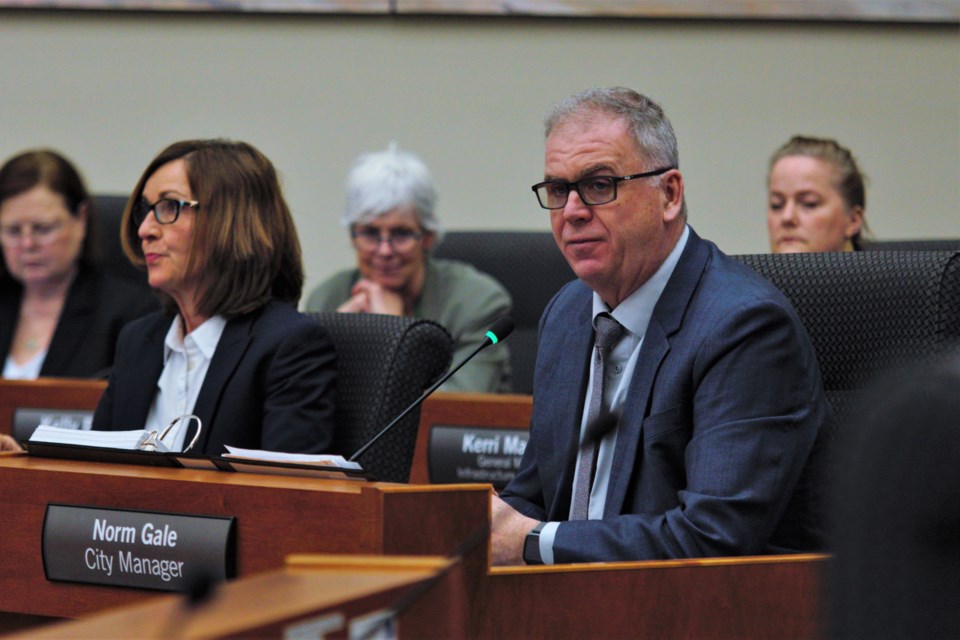THUNDER BAY — Thunder Bay’s city council has opened the door to reducing a proposed tax levy hike of 6.2 per cent the 2023 budget, asking staff to present options including possible service cuts to bring the number down to 4.6 per cent.
If council decided to move ahead with those options, it would lower a proposed tax levy increase that’s been opposed by the Thunder Bay Chamber of Commerce, which asked council to target a three per cent hike, and Mayor Ken Boshcoff, who said he wants to "hold the line" around two per cent.
Some councillors, however, said even achieving the 4.6 per cent target — which requires finding over $4 million in the budget — would involve unacceptably painful choices.
“I don’t think council is going to like what administration’s going to bring back,” warned Coun. Brian Hamilton (McKellar) during the first of four detailed budget review meetings held Tuesday.
While Hamilton said he was uncomfortable with approving a tax increase more than twice the size of last year's, he argued the alternatives could be even worse.
Others including Couns. Shelby Ch'ng and Andrew Foulds indicated they did not expect to support a significant tax levy reduction, saying it would require cutting too deeply into services.
Council also added $1.3 million in infrastructure spending to the 2023 budget Tuesday.
That bumped the tax levy increase up by more than half a point to 6.8 per cent before growth by the end of Tuesday’s meeting, making the job of staff tasked with sketching a path to 4.6 per cent even harder.
City treasurer Linda Evans provided the first official estimate of how the proposed tax levy would impact residents on Tuesday.
The draft budget put forward by administration would result in a $193 tax increase in 2023 for the owner of a median single family detached home with a $218,000 assessed value, Evans told council.
That was before increases approved by councillors Tuesday, though many have signalled their intent to reduce the levy over the course of the budget process, which concludes with a final vote on Feb. 6.
Coun. Mark Bentz launched those efforts, moving a motion asking administration to return with options to lower the tax levy increase to five per cent after growth, compared to a proposed 5.58 per cent.
“To get to the numbers that I think the public and this council may want is going to take more than we can muster around the table,” he said. “It’s not cutting a pickup truck or something like that — these are structural changes, and you’ll see in this resolution that it does ask permanent reductions of programs, service levels, and staffing complement be considered by administrators.”
An amendment that passed on a 7-6 vote later pushed Bentz's target further to seek options for a 4.6 per cent increase to the levy, or four per cent after growth.
Coun. Andrew Foulds suggested the use of reserve funds should also be on the table as administration suggests how to lower the levy increase to 4.6 per cent, with council approving an amendment to that end.
It’s a strategy that generally should be avoided, but could be justified in a year of historically high inflation, Foulds said.
Bentz also moved to add $1.3 million in capital spending to the budget, in order to stay on track with a council-approved plan to raise capital spending by five per cent per year.
That’s intended to help “chip away” at the city’s estimated $22 million-a-year infrastructure gap, a figure measuring how far the municipality is falling short in budgeting what’s needed to maintain and replace its capital assets, like buildings and vehicles.
Some councillors criticized administration for cutting capital spending in its proposed budget, which ran contrary to previous guidance from council.
“Last council, the directive was given to increase capital [spending] by five per cent every year,” said Coun. Albert Aiello. “So to be honest, I was somewhat shocked when you presented the budget this year, that wasn’t in there.”
Coun. Rajni Agarwal used harsher words, saying the previous council “gave clear direction which in my opinion was clearly ignored” and twice calling administration’s decision “shameful.”
City manager Norm Gale defended the move, saying the proposed capital cut had been the hardest among a number of difficult decisions taken to blunt the impact of inflation.
“When we were developing the budget, inflation was eight per cent, plus or minus, and we really wrestled with how to drive [the tax levy increase] down,” he said. “We must be nimble enough, and I must have the ability to bring you recommendations… when the context or the circumstances change.”
Adding the $1.3 million in capital spending to the budget would allow the city to reverse a planned cut in capital funding to the Thunder Bay Public Library, administration confirmed in response to a question from Coun. Shelby Ch’ng (At-large).
The library had publicized concerns the 15 per cent cut to its capital budget proposed by administration could force difficult choices up to and including a branch closure.
“We’re still not quite at the end of the tunnel, but if council does push through the restoration of funding to the library system, we’ll obviously be thrilled,” said library CEO Richard Togman. “I think it’s one of those things that the public really spoke out on.”
Togman maintains the city has perennially underfunded the library’s infrastructure needs, and said the need for further investments will be explored in a master facilities plan the library will develop this year with the help of public input.
Council will meet again on Thursday for its second detailed budget review session.
